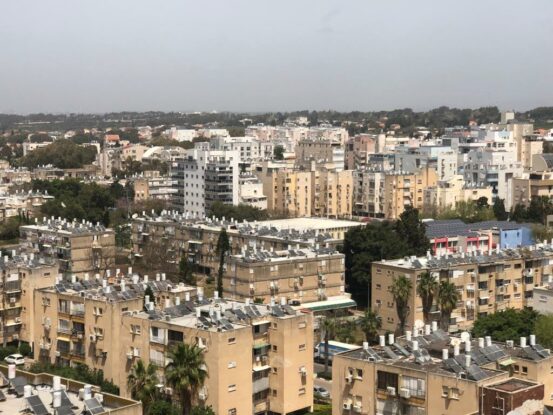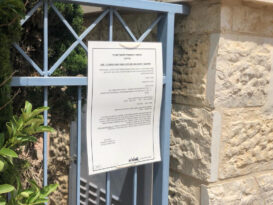A series of tax amendments introduced this month by the Minister of Finance seeks to “release” tens of thousands of apartments from owners who do not live in Israel, by abolishing tax benefits worth hundreds of thousands of shekels. Another amendment is expected to significantly reduce the purchase tax on medium value apartments, and increase the tax on expensive homes. In the past year alone, home prices in Israel have risen by 15%.
The sharp increase in housing prices has increased showing no signs of slowing down, leading the Ministry of Finance to present a series of tax amendments aimed at curbing price increases. These include plans intended to incentivize foreign residents to release tens of thousands of apartments they own to the market by canceling the exemption on capital gains tax.
According to the home price index published by the Central Bureau of Statistics on the eve of Passover, over the past year, there has been a steep increase of more than 15 percent in home prices. This is the sharpest annual increase on record in the last decade. Even before the publication of the latest data, the Ministry of Finance formulated a series of tax amendments aimed at cooling the apartment market, which was presented by Finance Minister Avigdor Lieberman in early April. However, Lieberman’s ability to implement the measures depends on the survival of the government, which is currently uncertain.
One of the most prominent measures in the plan is intended to increase the supply of apartments for the benefit of Israeli residents, at the expense of foreign residents. According to data from the Israel Tax Authority, approximately 83,000 apartments are currently held by non-residents, of which around 40,000 are in the two most sought-after cities – Tel Aviv and Jerusalem. In order to “release” these apartments from the hands of foreign residents, it was proposed to cancel the exemption from capital gains tax – a 25% tax imposed on the increase in the value of the apartment from the date of its purchase until the day of its sale – to anyone who is not a resident of Israel when selling the apartment, starting in 2024.
According to current tax laws, anyone who sells an apartment, whether resident or non-resident, is entitled to a full exemption from the capital gains tax, provided that it is his or her only apartment. Therefore, the cancelation of the exemption of capital gains tax for foreign residents is expected to be a significant loss to them, which against the background of the sharp price increases of recent years may be reflected in the taxation of hundreds of thousands of shekels at the time of the sale. The cancellation of the exemption will not take effect until 2024 which means that the Treasury is giving foreign residents the opportunity to “get rid” of their apartments and sell them before that date. The hope is that the sale of apartments by foreign residents will lead to a significant increase in the supply of apartments in Israel in the coming months.
Another step intended to reduce the attractiveness of owning an apartment for foreign residents is the abolition of the tax exemption on rent, which currently applies to those whose monthly rental income does not exceed NIS 5,200.
Another interesting amendment concerns the period when homeowners can own two residential apartments simultaneously, and still be considered the owner of a single apartment. Currently, this period is set by law at 24 months allowing people to purchase a new home before selling their current home. According to the Treasury, this is too long a period that supports high-income households who are able to own two apartments at the same time, while benefiting from an increase in the value of both apartments, and harms young couples who wish to purchase an apartment. Therefore, it is proposed in the framework of the draft to shorten this period to 12 months.
The draft also proposes an update to the purchase tax (mas rechisha) thresholds that are applicable to owners of a single apartment, in a way that will reduce the tax burden on purchasers of a medium value home and increase the tax for buyers of expensive apartments. According to the proposal, the portion on which no tax is paid will be increased from NIS 1.8 million to NIS 1.93 million. The threshold for which tax is paid at a rate of 3.5% is proposed to increase from NIS 2,141,605 today to NIS 2.33 million. The threshold for which 5% tax is paid, on the other hand, is proposed to lower from NIS 5,525,070 today to NIS 3.1 million, and the threshold for which 8% tax is paid to lower from NIS 18,416,900 today to NIS 5.3 million. Any amount beyond that will be taxed at 10%.
This means that on the purchase of apartments priced at up to NIS 3 million, the tax payable will decrease, apartments priced around NIS 3.5 million will be taxed at a rate similar to today’s rate, but for more expensive apartments the purchase tax will increase significantly.
Another amendment was proposed in relation to the taxation of the purchase of “shell apartments”. This is when apartments are sold directly from the contractor without internal walls or finishing works inside the apartment. This form of purchase is mainly characteristic of the upper echelons of society who are able to finance the completion of construction using high-level interior design services. In such cases, there has been an ongoing dispute as to whether such an apartment is considered a residential property for the purpose of charging purchase tax. The draft proposes to explicitly state that a “shell apartment” is indeed a residential apartment for tax purposes.
Are these amendments likely to change the price trend in the housing market? The economic media guesses that the answer is no, that the amendments are nothing more than cosmetic changes that will not make a dent in the market given the dimensions of the current crisis. After all, with due respect to foreign residents, their share of the Israel real estate market today is minimal, and even if the amendment will bring this sector to release about 3,000 apartments a month to market in the coming months, it is difficult to see how this will be in order to have a real impact on prices. Similarly, the sector purchasing shell apartments is extremely small, as are homeowners who temporarily own two apartments at the same time.
It seems, then, that if the government intends to take the housing crisis seriously, it will have to take much more dramatic steps than those presented so far. But before doing so, it has something even more fundamental to worry about — its survival.







